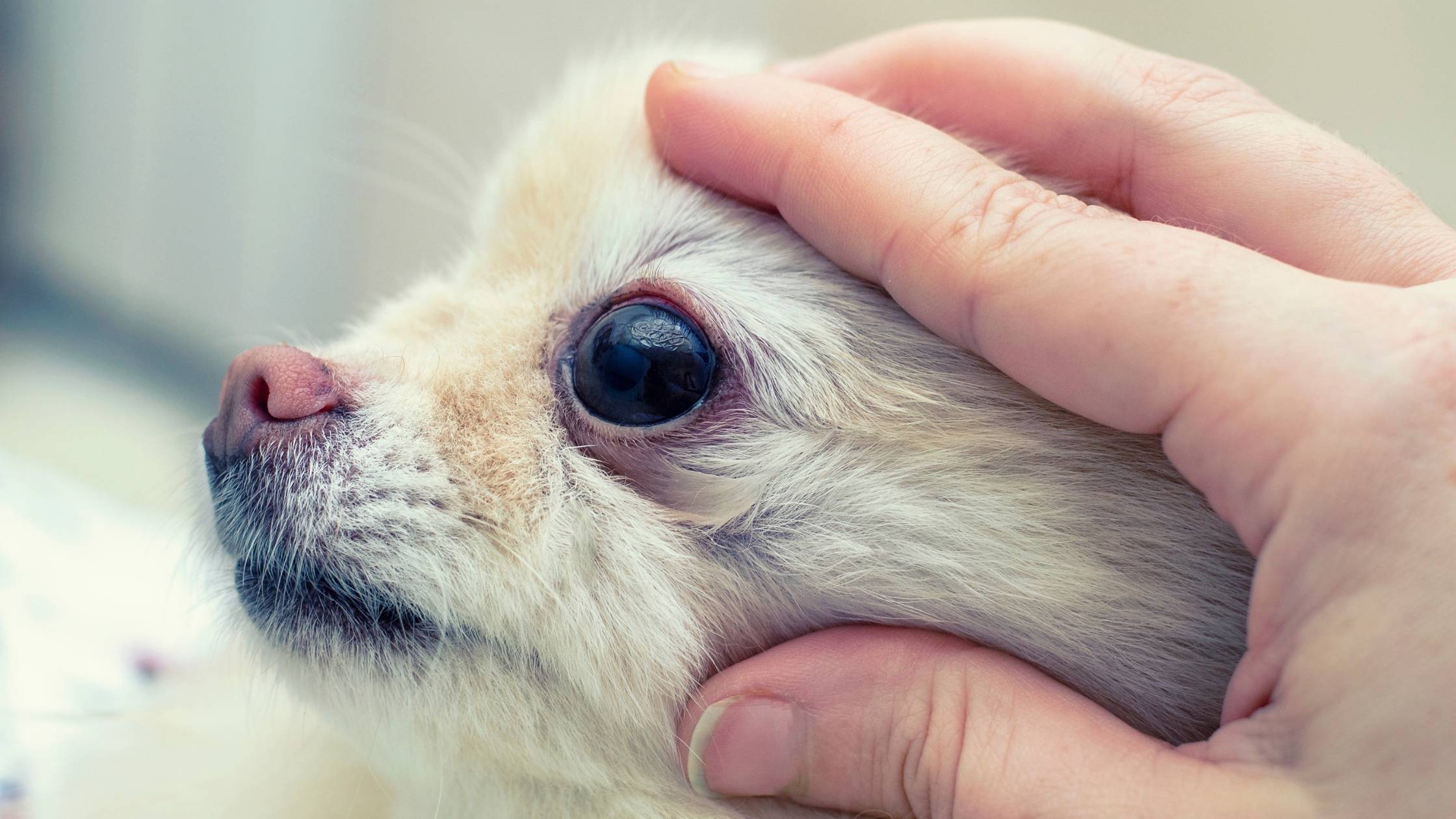Last Updated on 04/27/2022 by Kim Y
It’s no secret that dogs lose their hair, your couch and carpet can attest to that. Normal dog shedding should take place in a whole-body fashion and not go to the extreme of creating bald spots.
So, if it’s not a normal shedding pattern, then what is behind your dog’s sudden raccoon-eye appearance, and will their beautiful hair ever come back?
Let’s look into why your dog may be losing hair around their eyes and what you can do to bring back their complete haircoat.
Before we start into the causes of a dog losing hair around their eyes, and before you start panicking too much that your dog will be ring-eyed forever.
It’s important to know that the vast majority of cases of hair loss around the eyes will completely return to normal once the underlying issue is taken care of.
It’s also important to know that the regrowth of hair takes time, so don’t expect your pup’s face to fully return to normal in a matter of days. Think more along the lines of weeks to months.
Reasons Why a Dog May Be Losing Hair Around the Eyes
With hair loss around the eyes, it can be the result of an issue with the eyes themselves or the skin around them. Let’s further look into the differences between these two issues and how to determine the culprit.
A problem of the eye
A dog may be losing hair around the eyes as a result of rubbing a sore or uncomfortable eye. If you’ve ever seen your pup paw at their eye or even scoot around the carpet on their face, it’s because they’re trying to rub that eye.
With these types of movements, it’s no wonder your pup may experience a bit of hair loss. Eye issues like conjunctivitis (pink eye), glaucoma, keratoconjunctivitis sicca (dry eye), or an eye injury can cause pain, itchiness, and discomfort enough to have your dog rubbing the hair out around their eyes.
With eye issues, you will also notice other symptoms like clear or colored discharge, redness, or swelling around the eye. If your dog has an eye injury, the globe may be red and spidery or cloudy blue as well.
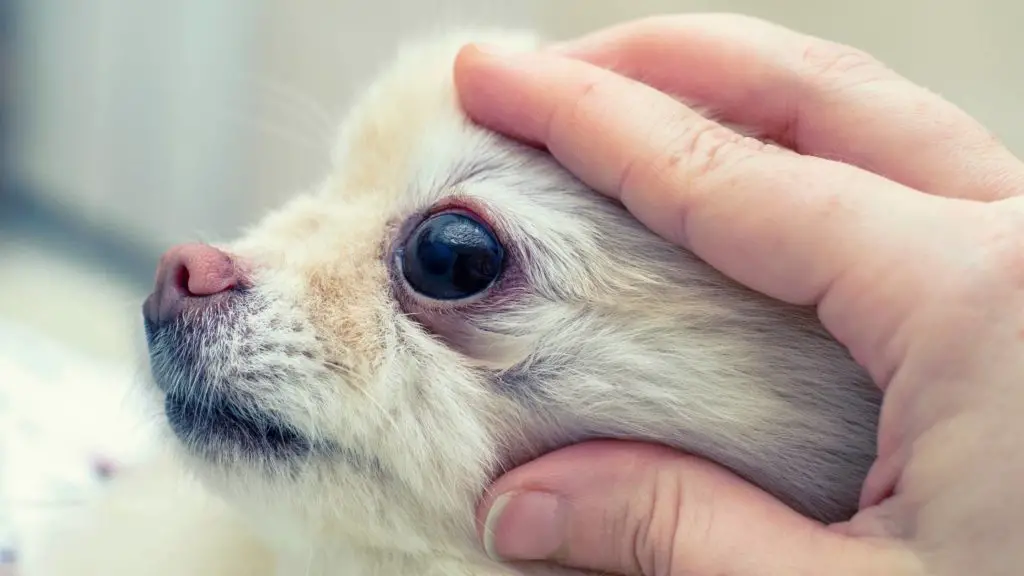
A problem of the skin
Skin issues that cause hair loss around the eye area a little more varied and are more likely to spread to other areas of the body.
Demodicosis – You’re not going to want to hear this, but your dog hosts a small colony of mange mites called Demodex canis on their skin at all times. If kept in small numbers, these mites are no problem, but if something goes awry and those numbers get out of hand, it could lead to hair loss and scaling around the eyes and beyond. Dogs with a Demodex infestation are usually the result of a weakened immune system either due to age, illness, or some other underlying issue. Demodicosis typically isn’t itchy and the hairless patches may spread from around the eyes and mouth to the rest of the face, head, and then body.
Ringworm – Contrary to popular belief and to what the name implies, ringworm is actually not a worm at all, but it can appear as a ring. Rather, a ringworm infection is a highly contagious fungal infection. Hair loss and scaliness of the skin are the primary signs, along with possibly redness and itching. The hair loss commonly shows up around the eyes and on the face because that’s what dogs typically use to greet others and with the contagious nature of the disease, it makes sense that the face would be the first place for it to show up. That’s not to say that it can’t show up or spread to other areas of the body. Also, it likes humans as well, so be careful how you pet your pup and always wash your hands!
Allergies – A dog may lose hair around the eyes as a result of allergies. This is because the mucous membranes, like those around the mouth, eyes, and nose, are highly sensitive to pollen, dust, and other allergens. The itching and swelling that allergies produce can cause your pup to rub and scratch at their eyes, taking the hair with them as they do. Allergies usually also show up with a runny nose, sneezing, and watery, red eyes. They may also be worse during certain times of the year.
Dermatitis – If allergies or eye issues are left untreated, your pup’s constant rubbing at their face and eyes can lead to dermatitis or a skin infection. Along with losing hair around the eyes, dermatitis may also lead to open sores, thick, colored discharge, and a foul odor.
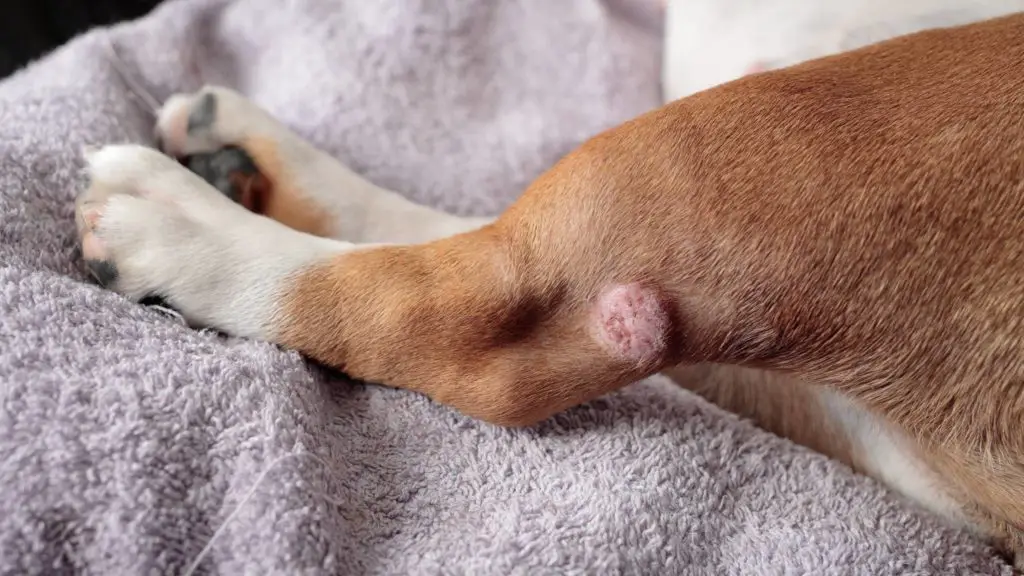
What Should I Do If My Dog Is Losing Hair Around the Eyes?
Most cases of a dog losing hair around their eyes should involve your veterinarian. Issues of the eyes should be immediately seen as you’ll quickly want to prevent further damage that could permanently affect your pup’s vision.
Your vet will be able to determine the cause of your dog’s hair loss by looking at the eyes and possibly performing tests for glaucoma and dry eye.
If the eyes aren’t the problem, your vet may take skin scrapings to look for mites and fungus. They will check over the rest of your dog’s body for hair loss and ask you about any other pets in the house that may be showing similar signs.
How is Hair Loss Around the Eyes Treated?
How you get the hair to grow back around your dog’s eyes is going to depend on why it was lost in the first place.
Once your veterinarian has diagnosed the reason your dog is losing hair around the eyes, they will line out a treatment. Again, don’t expect immediate hair regrowth.
These things take time. Also, treating the skin around the eyes can be very tricky and you’ll want to avoid the eyes with some medications.
Always follow your veterinarian’s instructions carefully to prevent any unnecessary damage.
In the case of an eye issue, your veterinarian may prescribe eye drops or ointments to clear up any infections or to treat an eye injury. For glaucoma, your pup may be referred to a specialist.
If your dog is experiencing a lot of thick, colored discharge from the eyes, you can help ease the irritation by gently wiping the area two to three times a day with a warm, wet washcloth.
For demodicosis and allergies, your vet will probably take a whole-body approach. Demodicosis requires an anti-parasiticide and allergies may take an anti-histamine or anti-inflammatory to reduce the itching and inflammation.
Allergy testing may also be necessary as it’s easier to remove an allergen than to treat an allergy. For demodicosis, your vet may perform additional tests to help determine why there is a lapse in their immune system. Some dogs even require immune boosters to prevent other illnesses due to a weakened immune system.
Dogs with hair loss around the eyes due to dermatitis or ringworm will get antibiotics or antifungal. These can either be topical and placed right on the affected area, or oral to treat the whole body.
If your dog is losing hair around their eyes, it could be a bigger deal than them just looking funny.
Hair loss around the eyes can indicate that something more major is going on that needs to be addressed in order to prevent further issues.
It’s important to involve your veterinarian in any cases of hair loss in your dog. Not only will they be able to pinpoint the exact cause, but they will also be able to get your dog started on a treatment that will have their face fully furred, just like it was before.
Can alopecia cause hair loss around a dog’s eyes?
Alopecia is usually treatable in dogs and the condition can be reversed if treated early. Some dogs suffer from seasonal alopecia where a patch of hair doesn’t grow back for a while. If your dog has alopecia, give them soft surfaces to lie on and keep their skin clean to prevent infections. Bulldogs, Boxer Dogs, Terriers and Schnauzers are most commonly affected by alopecia.
Could a foreign body cause my dog to lose hair around his eyes?
It’s possible that a foreign object has found its way into your dog’s eye, causing excessive scratching that can lead to bald spots around the eye area. If your pup is pawing at his eye and squinting, these are indications that something is irritating his eye. It’s important to seek veterinary advice because your pooch could cause further damage to the broken skin around the eye area by your dog rubbing it.
Your vet may suggest trying to flush out the object at home with a saline solution. However, if this doesn’t work you should take him to see your vet so they can attempt a different treatment option. Never try to remove an object from your dog’s eye with your fingers or tweezers as this could cause damage. If your pet requires surgery, this will be done under local or general anaesthetic. Antibiotics will be given to treat any secondary skin infections.
Can fleas cause hair loss around a dog’s eyes?
All parasites, including fleas, ticks, mites, lice and worms can cause discomfort and hair loss in dogs if left untreated.
Not sure whether your dog has fleas? Whilst bald spots are a common sign, your pet may also be scratching and have red areas on his skin. You may also see tiny black specks in your pooch’s fur. To check for fleas, use a fine-toothed flea comb and deposit your findings on a piece of white paper or kitchen paper. If you’re still unsure whether your pup has fleas, speak to your veterinarian for advice.
Your pup’s hair should grow back on its own but regular grooming will help. Diet and flea prevention also plays a big part in helping your pet’s fur to stay healthy. Flea infestations can be treated with spot-on treatments, sprays or powders.
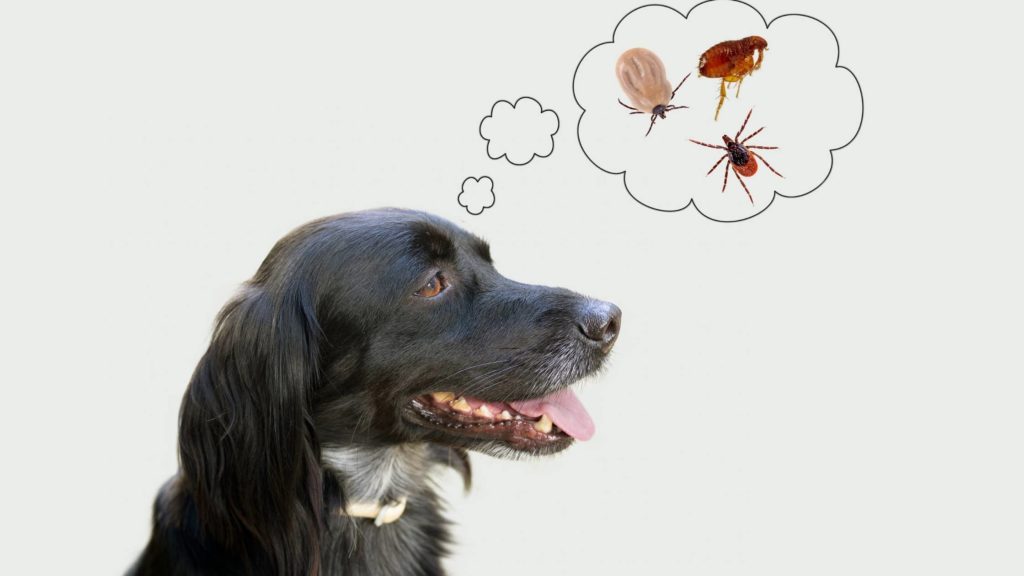
What is cherry eye and does it cause dogs to lose hair around their eyes?
Cats and dogs both have a piece of skin that gives an extra layer of protection around their eyes. This is often called a third eyelid. Occasionally, this layer of skin can become red, swollen and inflamed, giving the name ‘cherry eye’. It’s important to get this common eye condition treated as soon as possible because it can cause pain and discomfort to your pup. As the sensitive eye area becomes irritated, hair may fall out.
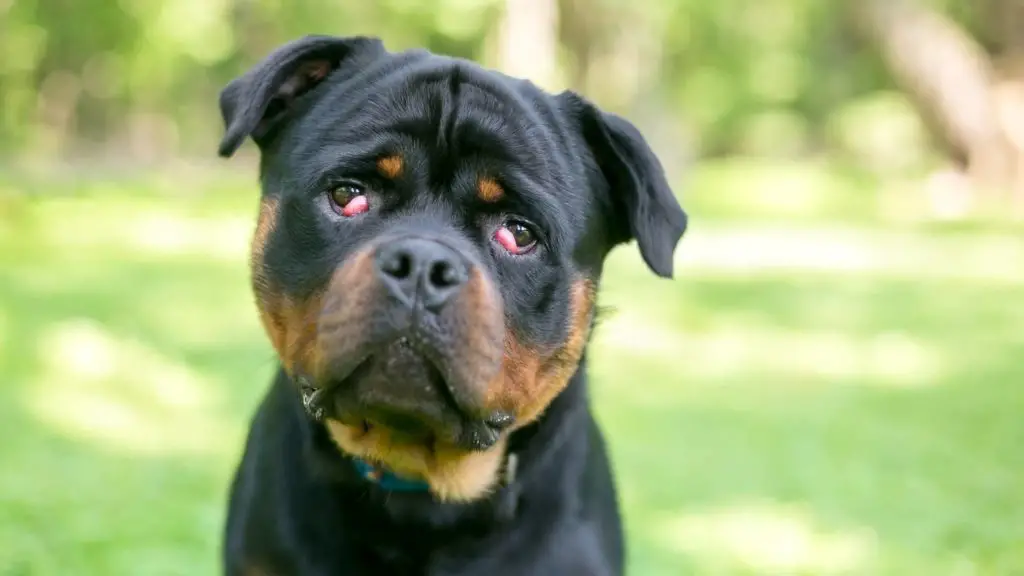
What is tear overflow in dogs?
Some breeds of dog suffer from tear overflow, where the moisture around the eye area could cause bacterial skin infections or a highly contagious fungal infection and even hair loss. The cause of tear overflow should be treated by your veterinarian.
Could hair loss around my dog’s eye be a mineral deficiency?
Although a lack of copper, zinc and selenium can lead to fur loss in some animals, it’s unlikely to affect dogs.
Can fur loss be caused by an insect bite?
It’s possible that stings and bites from insects can cause a rash or hives to develop in dogs, which may lead to bald spots occurring. Some medications and even plants could cause rashes and hives to develop, so it’s important to get them treated as soon as you notice them on your pup’s fur or skin.
Is it normal for a dog to have bald spots?
Bald spots are not normal in dogs of any age and the cause of hair loss should be investigated by your veterinarian. Balding could be linked to a few health issues including:
Genetics – illnesses and health conditions that cause fur loss are a sign of an irresponsible breeder. Good breeders will conduct genetic testing to reduce the likelihood of health conditions and diseases in their puppies.
Cushing’s disease – when a dog’s body produces too much of the stress hormone cortisol, it can cause bald spots. This condition needs to be diagnosed and treated by a vet.
Pressure sores – repetitive motion and too much grooming can cause pressure sores, which leads to bald spots from the irritated skin.
Hypothyroidism – bald spots can indicate when a dog’s thyroid is underperforming. Speak to your vet for diagnosis and treatment options.
Can puppies lose hair around their eyes?
Puppies can also experience fur loss around their eyes for the same reasons as older dogs. Ringworm, mites and fleas that can cause bacterial infections are the most common reasons why young dogs suffer from hair loss.
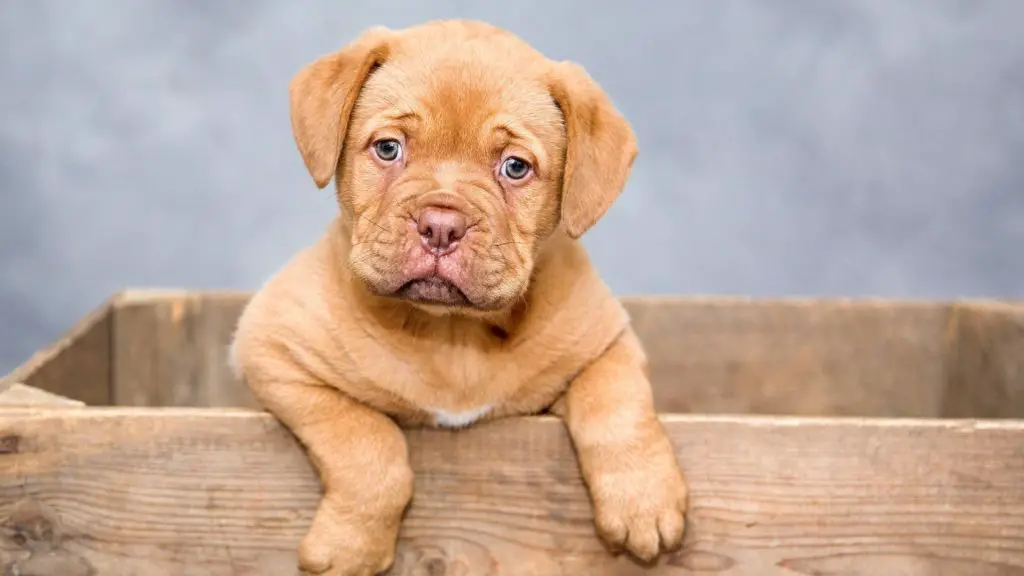
How can I take care of my dog’s eyes?
Cleaning your pooch’s eyes regularly with clean water and a soft cloth or cotton ball will ensure any debris is wiped away before it can cause any damage or infection. A dog’s skin and eyes are extremely sensitive so checking to see if there is anything unusual happening or weepiness will help to keep them healthy. If you have a long-haired pup, book him in for a regular hair cut to prevent hairs from getting into your dog’s eyes and irritating them. Simply washing your pet’s eyes regularly can help to stop diseases from getting into the delicate eye area.
When should you talk to the vet about hair loss in your pup?
If your dog loses hair around the eyes or experiences other symptoms such as a loss of appetite or fatigue, book an appointment to see your veterinarian as soon as possible. Bad odours, itching and skin lesions are other signs that your pet needs medical attention. Your vet will be able to determine the cause of your dog’s hair loss by examining him and conducting some tests. It’s better to be safe than sorry when it comes to your beloved pooch, and hair loss often causes discomfort and pain in animals.

